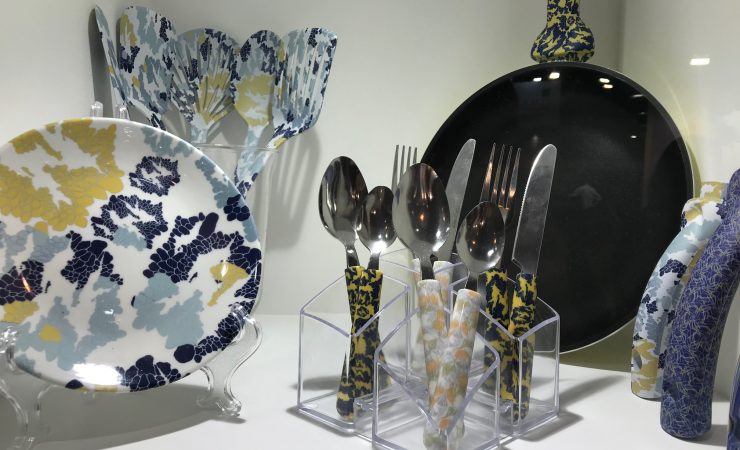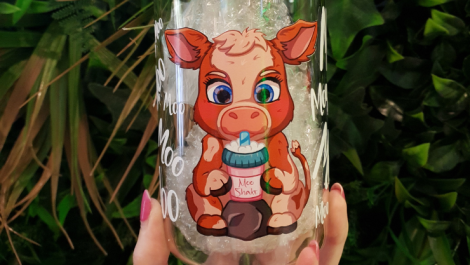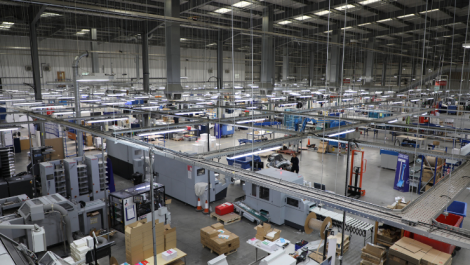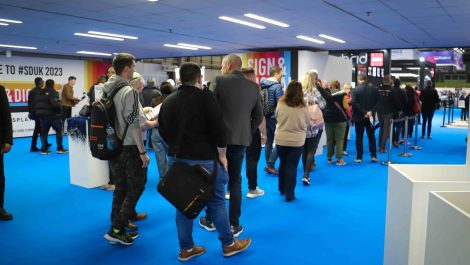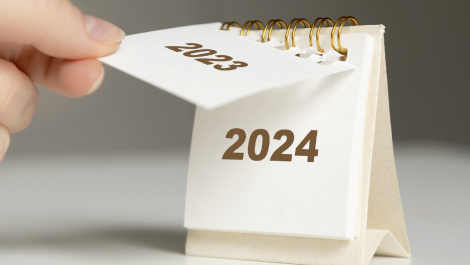With a little creativity, there is a whole raft of profitable promotional items that you can offer and reasonably priced devices to enable you to make them. Jim Bower exercises his imagination.
In recent years a new dimension has been added to print – namely, the third. In the consumer market, this could mean adding a picture of your kids to a mug or a saucy slogan to a hen-night T-shirt and for a blossoming B2B promotional products sector, perhaps adding the company or product logo to keyrings, pens, lighters, golf balls – almost anything goes.
According to Epson, the value of the UK and Ireland printed promotional products market is given as anything between £700 million and £1 billion per annum. The wide difference is not down to a lack of data but depends on what is and what is not included.
Epson’s dye sublimation range of printers combined with a vacuum oven can handle a huge variety of promotional products. In addition to the pens, electronics, fobs and phone cases, it has used recent trade events to show more unusual products such as helmets and even toilet seats.
The company is keen to emphasise that this market can be entered at a relatively low cost. ‘It is possible to purchase a SureColor SC-F6200 for under £5000 and an oven from around £3000,’ says UK sales manager Phil McMullin. Dye sublimation machines like this can handle soft signage and other textiles, but by using polyestercoated substrates they can as easily produce hard surfaced products like picture frames, plates, cutlery, jewellery and much more.
‘Personalised products are appealing to a broad market,’ says Mr McMullin, ‘but some of the most successful items target a specific age, gender, geographical location or income range and need to be sympathetic to their values, attitudes and interests. Successful products are often seasonally relevant – Christmas is, of course, a boom time – and can even be related to a specific event; think of the 100th anniversary of the First World War just celebrated, but equally sporting or cultural events, large or small.’
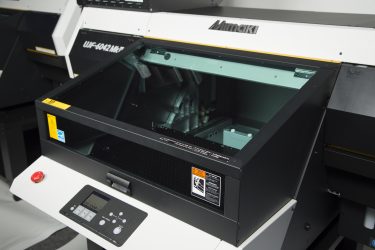
Mimaki’s UJF-6042 MkII UV prints on a variety of smaller items
Curves no object
While many applications will always suit the dye sublimation method, a raft of new opportunities is opened by directto-object printing. Following the release of its UJF series of small format UV LED flatbeds back in 2009, Mimaki has been a leading player in this area, achieving an installed base of several hundred machines in the UK alone. 2016 saw the launch of the UJF-3042 MkII and UJF-6042 MkII with a number of upgrades and enhancements.
Brett Newman is chief operations manager at Hybrid Services, Mimaki’s exclusive UK distributor. He sees the need to differentiate as the key to a competitive market. ‘We are now used to the idea of personalisation, adding logos to keyrings or designs on a phone case used to be novel but are becoming commonplace. The coming trend is for greater creativity,’ he says.
‘We are seeing increased interest in the idea of adding texture to promotional products. Our clear inks provide spot varnish and embossing effects, often creating tactile patterned surfaces which are really effective and different. We supply both the hardware and software to make this easy.
‘We also consider quality to be an important aspect, especially in the corporate world. A substandard print reflects badly on a brand. If you put a logo on a golf ball but it degrades when hit, you’re in trouble! Our inks are flexible, durable and fit for purpose.’
Roland DG is another significant player in this market. As well as its Texart range of dye sublimation printers, its VersaUV LEF series bench top UV printing solution has become an increasingly popular choice. The VersaUV S-Series introduced earlier this year also offers a large print area in flatbed and belt options.
‘Technology has become smaller and more affordable, meaning the barrier to entry is nothing like what it was 10 years ago,’ says Rob Golenowski, head of sales for UK and Ireland. ‘This has generated lots of competition and prompted innovation in several areas. This is great news for the customer since they can find quirky and unique products to fit their niche, from customised gaming controllers to personalised bars of soap and everything in between. We’ve found that our customers want versatility. They want machines that can print on leather, wood, glass and a wide array of plastics, to name a few.’
Keith Pratt, managing director at Atlantic Tech Services, says: ‘When I started in print, I would never have imagined that I’d be selling machines that print on candles! Now it’s hard to imagine anything we can’t print on – the only real limit is size.’
Atlantic provides the UK outlet for the Azon range of UV printers, which are manufactured in Croatia. ‘It’s a very healthy market at the moment, and we have machines which can take full advantage of that,’ says Mr Pratt.
While Azon’s market share of the UV flatbed market compared to the likes of Mimaki or Roland DG may be relatively small, it is growing rapidly. Mr Pratt claims a 300% rise in sales in 2018. One of the key features of the company’s flagship Matrix model is its ability to print at an ultra-high 2880dpi resolution. ‘Most people will use this kind of equipment to add logos or slogans, but we have customers producing fine art prints for retail,’ he says.

DecTek’s Mike Beese has printed on everything from leather diary covers to tape measures
The jig’s up
Another feature of the Matrix is scale – a bed length of 2.5m allows for more products per pass, and its printhead is designed to move across a static bed, which means new jigs can be loaded before the pass is complete, with significant productivity benefits.
South Korean manufacturer Axzyra is another brand which may be one to watch in future. It has a UK branch based near Cambridge. Founder/director Steve Woods explains, ‘In the promotional market there is a need for an affordable desktop UV printer that can print to most surfaces and materials. Customers are looking for small personalised quantities, often for seminars, trade shows and product launches.’
Axzyra manufactures the Apache range of UV inkjet printers. There are five models, with a sixth in the pipeline; the company will launch the Apache 4545 at the Merchandise World show in January 2019. Based in Pontypridd, DecTek is a multiaward winning manufacturer of digitally printed and polyurethane resin coated products for branding, marketing and advertising.
The company’s foundations were built on the production of name badges, which used the benefits of variable data to the full – labels would be printed and then resin coated. Over the years the company branched out into new areas with various base materials and coatings.
DecTek recently expanded its product offering further by installing a flatbed printing section for direct-to-product print, comprising a Mimaki JFX200 and two Mutoh 426UF machines. ‘We are always looking to expand our product range,’ says managing director Mike Beese. ‘Promotional products are a definite growth area. Adding logos or other designs to leather diary covers was one of our early jobs, but since then we’ve produced personalised pens, lighters, calculators, clocks, rulers, and we’ve even printed on tape measures.’
Mr Beese makes a point which all promotional product printers will very soon need to take into account, if they don’t already. ‘As a company which deals with plastic products, we are very aware of environmental issues. We are committed to finding alternatives to plastic as part of a wider drive for more environmentally friendly products and production processes. For some time it has been a requirement when tendering for government or local council work, and many retailers are committed to plastic reduction programmes.’
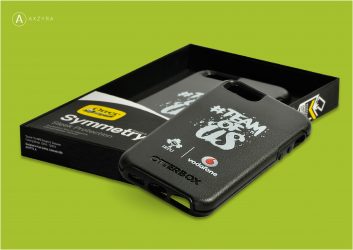
Call me: mobile phone case printed on an Axzyra Apache printer
Graceful degradation
He continues: ‘This means more reusable products, more which are not plastic-based and more which are biodegradable. We are increasingly forming to metal as an alternative to plastic. The Mimaki machines can print direct to metal. We can print on a biodegradable vinyl on the Mutoh machines, then we laminate that to metal before cutting and forming. So if that product ends up in landfill or the sea, the coating will dissolve and the metal will degrade.’
Jim Nicol is managing director at The Magic Touch, suppliers of image transfer papers, heat presses, laser printers, plotter/ cutters, materials and equipment to the promotional market for over 25 years. The company is a platinum dealer for Sawgrass dye sublimation machines and also carries a range of toner/transfer solutions – but no UV. ‘We think UV directto-product is overkill and too much of a financial commitment for most people in this market, which is increasingly a cottage industry. Over 50% of our new customers operate from home,’ he explains.
Whatever their size or nature, Mr Nicol has some good advice for any company approaching the promotional product market. ‘The profits are in B2B, and if you’re selling the idea of a one-off product, get hold of your target’s company logo and make the actual product for them! We’ve found cork notebooks to be highly effective for this, setup costs are minimal and there is a high conversion rate to future orders. Plus, because it’s classed as marketing, it’s tax deductible. ‘Once they’re ordering notebooks, the next time you call round, give them a free mug,’ he suggests.
If you’re creative, with an eye for novelty, the fast-moving promotional products market is a lively place to be at the moment. With a relatively low entry cost, it is not hard to dip a toe in the water before taking the plunge – and you need only look at how Vistaprint tries to get us to add mugs, mats or keyrings to print orders to see the potential for upselling to your existing base.
